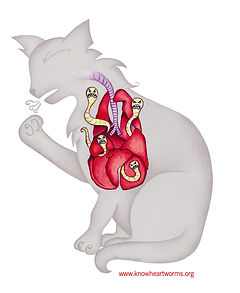_.png)

Heartworms in pets
is a serious but preventable disease, that can end in death, if left untreated.
What's the big deal about heartworms?
Heartworms or Dirofilaria immitis, are worm-like parasites that can reach up to a foot in length if left untreated and is one of the most deadly diseases that pets face and it is almost 100% preventable. It is estimated that over 1 Million dogs in the U.S. have heartworm disease today. While dogs seem to be the main target of the disease, cats and other small mammals can also become infected. The disease is transmitted by mosquitoes, who then leave a larval form of the worms behind after bites.
How does the osquito transmit the disease?

The mosquito becomes infected by biting another infected animal and ingesting the microfilaria. The microfilaria are then carried by the mosquito and mature inside the mosquito over the course of a week or so. When that mosquito bites another animal, the matured microfilaria larva, are then passed on to the new animal during the bite. If allowed to mature, the adult heartworms travel to the pet's lungs, not the heart despite the name. If untreated, these heartworms cause extreme health issues, which may lead to death.
Due to the mosquito's role in the spread of this disease, it is highly recommended that you protect your pet through the warmer months. In Florida, it is recommended that you protect your pets year round.
How do I prevent my pet from being infected?

The American Heartworm Society recommends that pets be on a form of preventative year round. A pet owner can choose from many options, traditional preventatives or natural/holistic methods. This do NOT prevent your pet from being bitten, but they do prevent the disease from progressing when administered correctly. Always follow the directions, or your pet may be at risk. Not only does the preventative protect your pet, but it also prevents another animal from being infected.
How do I know if my pet is infected?
The signs of heartworms many pets show few symptoms or no symptoms at all. The longer the disease is left unchecked however, the more likely you will begin to see more pronounced signs.
According to the American Heartworms Society the signs of heartworm disease in dogs: "may include a mild persistent cough, reluctance to exercise, fatigue after moderate activity, decreased appetite, and weight loss. As heartworm disease progresses, pets may develop heart failure and the appearance of a swollen belly due to excess fluid in the abdomen. Dogs with large numbers of heartworms can develop a sudden blockages of blood flow within the heart leading to a life-threatening form of cardiovascular collapse. This is called caval syndrome, and is marked by a sudden onset of labored breathing, pale gums, and dark bloody or coffee-colored urine. Without prompt surgical removal of the heartworm blockage, few dogs survive."
Cats who are infected can show different signs than dogs, and can also vary in their intensity. Typically a cat may show symptoms may include coughing, asthma-like attacks, periodic vomiting, lack of appetite, and/or weight loss. Sometimes a heartworm positive cat may have difficulty walking, faint, have seizures, and/or have fluid retention within the abdomen like their canine counterparts. Unfortunately sometimes the first and only sign a cat is heartworm position is sudden collapse, or death.
What is a heartworm test and how long for results?


Heartworm tests require a small amount of blood from your pet. Your vet will draw blood from your pet to use for the testing. Typically your vet will look at two different factors, if there are antigens present and if microfilaria are present.
Usually Vets test in house, meaning the equipment needed to test the blood is in their facility, meaning you usually have the results before you leave. Some Vets send off tests, this can take a couple of days.
What do I do if my pet is heartworm positive?
A positive result isn't the end of the world, but it does mean treatment is needed. Here's where we need to point out that there is NO treatment for cats. Your veterinarian will work with you to formulate a plan of treatment to stabilize your cat and look to long term management. The medicine used in dogs for killing the adult worms can kill a cat.Indoor and outdoor cats are susceptible to heartworms.
There are two treatments available to dogs. If the dog is a "mild" or "light" positive, they can begin an ivermectin-based preventative treatment. For those dogs who have a more severe disease, a more intense treatment is needed. They will receive a series of injections into the muscle along their spine. This is a painful and tiring treatment. A dog under this treatment must absolutely remain calm, go on leash walks, no physical activity for one month after each injection. This can be difficult for your dog and you! It is also expensive. Given those negatives, the positive outcome of the treatment is high. The dog is tested no later than 6 months after the completion of the treatment and a course of action is determined then.
